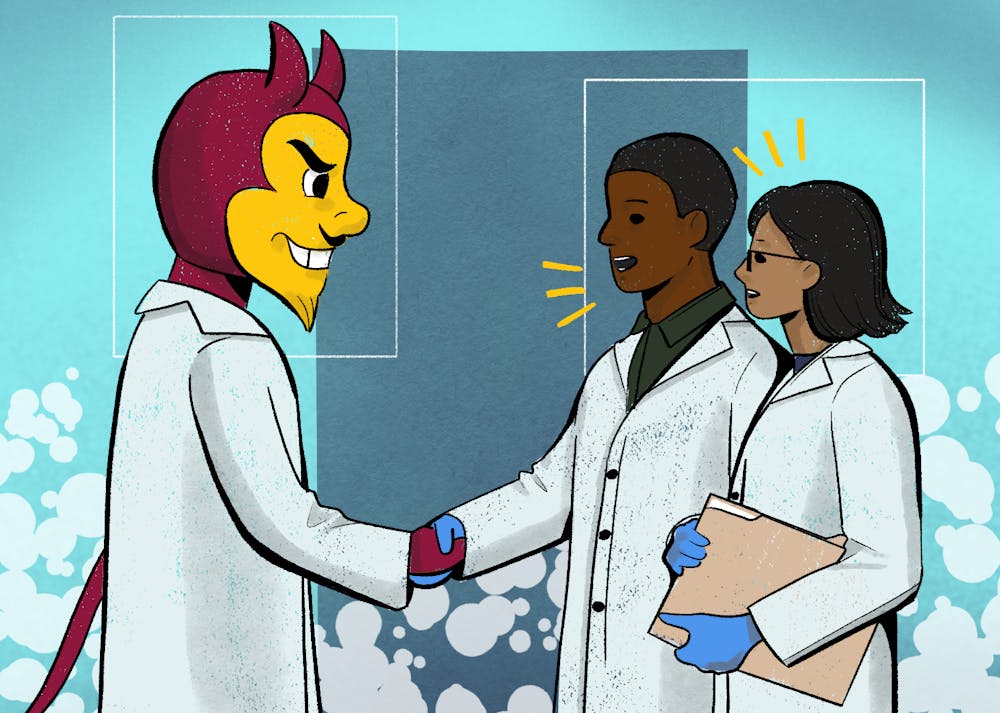Imagine a world where neurodevelopmental diseases are eradicated, where an individual can take antibiotics without developing resistance, and where there are prospective treatments for rare terminal cancers.
This seemingly utopian world is, in fact, attainable thanks to numerous advancements in translational research. Three ASU labs have been selected for coveted Flinn Foundation seed grants to propel their research findings toward developing viable treatments.
According to the Flinn Foundation, to be eligible for these seed grants research teams had to address significant clinical needs in the areas of diagnostics, medical devices, therapeutics, precision medicine or healthcare delivery. The seed grant recipients are Carl Wagner, Rosa Krajmalnik-Brown, James Adams and Tatiana Ugarova.
Krajmalnik-Brown is the director of the Biodesign Center for Health Through Microbiomes and a professor at the School of Sustainable Engineering and the Built Environment at ASU. Adams is a President’s Professor in the School for Engineering of Matter, Transport, and Energy and the undergraduate program chair for material science and engineering in the Ira A. Fulton School of Engineering at ASU.
Together, the two have been doing research on gut bacteria in autistic individuals for a dozen years. The research shows that autistic individuals have very abnormal gut bacteria, which seems to be correlated with both worse autism symptoms and gastrointestinal symptoms.
To explore further, they have researched microbiota transplantation, which involves collecting gut bacteria from healthy people to create a super probiotic for autistic individuals. This has resulted in significant improvements in their GI symptoms and their mental health symptoms.
"We sequence the bacteria taken from the children and adults in this study before and after the treatment," Krajnalnik-Brown said. "We requested this grant to perform deeper sequencing of the bacteria and to be able to sequence most of the genomes in the (subject's gut) microbes ... The fact that we are doing deeper sequencing might allow us to hypothesize what are some of the actions that these microbes are doing, to improve gastrointestinal symptoms and behavior. This will help us optimize the treatment."
There is no FDA-approved medication for the core symptoms of autism. According to Adams, since it was discovered that bacteria contribute to the symptoms, this lab has the remarkable opportunity to make the first approved FDA treatment for autism.
Ugarova, a professor in the School of Life Sciences, runs another seed grant project. Her research focuses on antibiotic resistance, where bacteria that survive a round of medication grow more robust against future rounds.
Not to mention, according to the World Health Organization, bacteria that resist antibiotics are one of the top ten threats facing humanity.
"Antibiotic access is one of the most important equity issues of our time," Ugarova said. "We believe we can make a difference for underserved and rural communities with the commercialization of this therapeutic."
Based on 20 years of National Institute of Health-supported research, Ugarova has found a molecule, MC121, that discriminates between antibiotic-resistant and antibiotic-sensitive bacteria. While traditional antibiotics kill bacteria, the MC121 molecule binds to bacteria to create sites for white blood cells to destroy it.
"We demonstrated that in infected mice, MC121 causes a quick clearance of antibiotic-resistant bacteria, resulting in a significant survival of animals," Ugarova said. "We developed a simple procedure for producing MC121 in large quantities that will allow us to evaluate the MC121's prospective effect in various mouse models of infectious diseases."
Utilizing this grant, Ugarova will screen different bacteria with the molecule MC121 and observe how different bacteria react to the molecule's presence.
Wagner is an associate professor in the New College Environmental Health Science Scholars at ASU. His research renders a promising treatment for a currently non-curable heterogeneous group of rare cancers. This orally administered treatment will replace the existing treatment, which has toxic side effects.
These laboratories at ASU have made significant advancements in translational research, broadening the horizons for currently deemed incurable diseases. The promising trajectory of their work indicates a bright future ahead.
Edited by River Graziano, Walker Smith and Caera Learmonth.
Reach the reporter at asing548@asu.edu.
Like The State Press on Facebook and follow @statepress on X.




